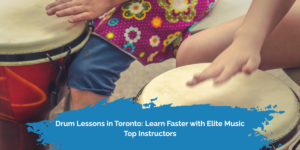Children who practice music have the added benefit of increased positive effects on their brain development. In addition, musical training has been associated with higher IQs and higher academic scores in tests, particularly those involving language and Math.
But – why is this, exactly?
There are some controversial perceptions regarding music and its origins, whether music came before speech or if speech was evolved directly from music. However, music is a universal language that surpasses that of speech since it can be communicated over multiple diverse backgrounds with a common understanding.
So, how can you find out whether or not practicing music changes cognitive development? Even with all of the studies and research done on music and its effects, can you actually assess for yourself the impact that musical learning has on the brain?
There are some ways below to find and see the impact that music and musical practice make on a child’s brain and how it helps with their development.
SCIENTIFIC DISCOVERIES
Scientists from MIT identified that the brain’s neural pathways react to just hearing music and that it can be any type or form of music that causes this reaction in the brain. Not only did it demonstrate that hearing music causes a response, but the reaction is only in one area of the brain, exclusively.
This finding shows that every person, including children, has a specific place within the brain that is alive when music is involved. Because of this, the brain will have elevated functions when a child is listening to music and playing it. Therefore, practicing music requires the use of the brain across multiple areas.
MEMORY RECALL
Making music created a high level of brain activity that has been linked to academics in ways that involve logic, reasoning, complex problem solving, and conceptual tasks. If you wanted to test this theory, have your child take private piano lessons. Before taking the music lessons, you can play a memory game together and see how well they can remember the pictures or words during the game.
Wait an appropriate time for your child to become accustomed to playing and practicing the piano. Once you see that the child is learning a piece of music, you can bring the memory game back and play a round or two. See if you notice easier recall from your child – and you should, since research shows children who study and practice music have highly developed memory systems.
MATH AND LANGUAGE
Another way you can see how the practice of music within a child’s life is incorporated with their cognitive development is through some simple language and math skills. For example, babies typically hear lullabies and have, in turn, been able to develop their language by listening to the sing-song tones of music.
If you have an infant or a very small child, you can use this sing-songy voice in a rhythmic pattern with the same notes daily with a phrase or a couple of musical phrases. See if you notice that your baby eventually can repeat the pattern or phrase back to you after hearing it multiple times. You will be surprised at how quickly they can pick up on those language skills!
Another way you can test math skills with the brain is through some simple logic problems. Of course, this will only work if your child is older, but practicing music with things like timing, beats, key, and time signatures learned when playing provides a solid mathematical foundation for your child. Ask your child some mathematic logic puzzles prior to them practicing their music, and then again after they spend time practicing, and see if there is a noticeable difference.
EMOTIONS AND FEELINGS
Music is a medium that allows children to express themselves freely and identify emotions. Having the freedom of expression is yet another benefit that musical practice can provide children – the ability to express their own feelings and identify those emotions in others. Take some assessment with your children as they become more in tune with dynamics on the piano, knowing when to make the sound louder or softer, more legato (flowy) or staccato (punched).
You should see that when your child understands more about dynamics in their musical practice with learning how to play the basics of drums, guitar, or any other instrument or start with some easiest piano songs. It correlates to how they express their own feelings. The musical practice provides them with a deeper understanding of what feels sad, happy, and other emotions in between. They also are given the ability to empathize and read others’ feelings in turn.
CONFIDENCE AND SOCIAL SKILLS
Another added benefit to musical practice that can be found in children is through building confidence and advanced social skills. Confidence is acquired simply through conquering and achieving a goal. Music provides children with the skills to tackle complex pieces and learn how to read music. With a lot of practice, children become increasingly confident in their abilities. With that confidence, they tend to become more social with others.
You can easily see this by seeing your child more willing to tackle or lead in other aspects of their lives, such as making new friends at school or trying out for the school play or a sports team. The positive effects on the brain are that practicing music will help children feel less afraid of trying new things or meeting new people.
POSITIVE BENEFITS FROM PRACTICE MUSIC
Development of skills and abilities are essential for any child, and with musical training, it is clear that they are given many added benefits. In addition, there are other beautiful advantages that music provides, such as improved fine motor functions, elevated mood and less stress, and even an increased ability to appreciate cultures and learn other languages.
Music is a way to bring joy to your child and motivate them to learn discipline, time management, and other essential life skills. If you want to put all of the research and studies on music learning to the test, you can find ways to test them yourself with your children and see how their brains respond. When the area of the brain that responds to music is well-utilized, you can see the many other positive effects on a child’s development.
5 Ways To Find Out How Musical Practice Can Affect Cognitive Development Among Kids





